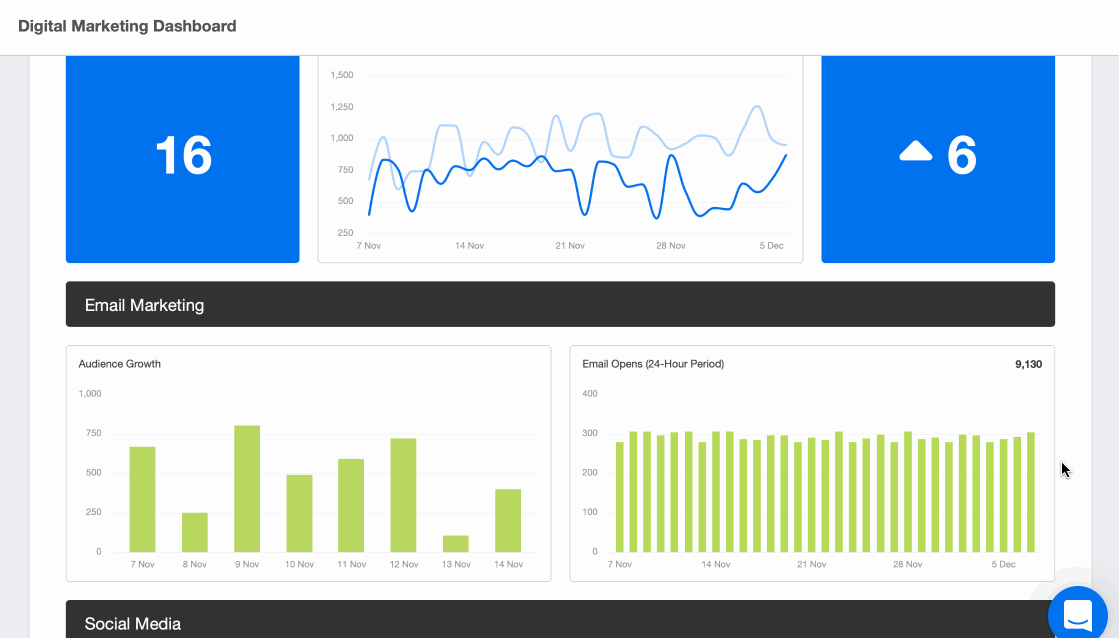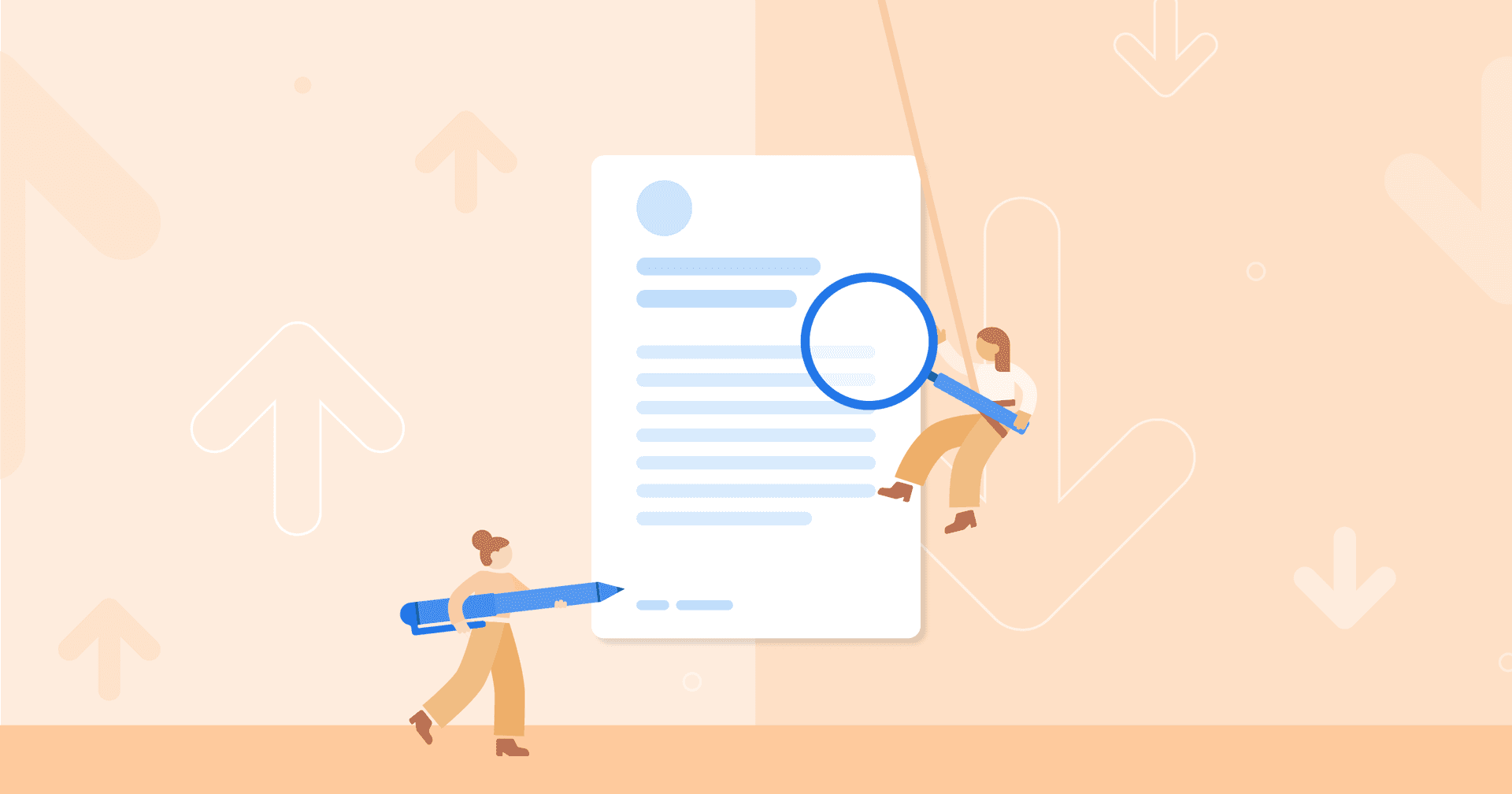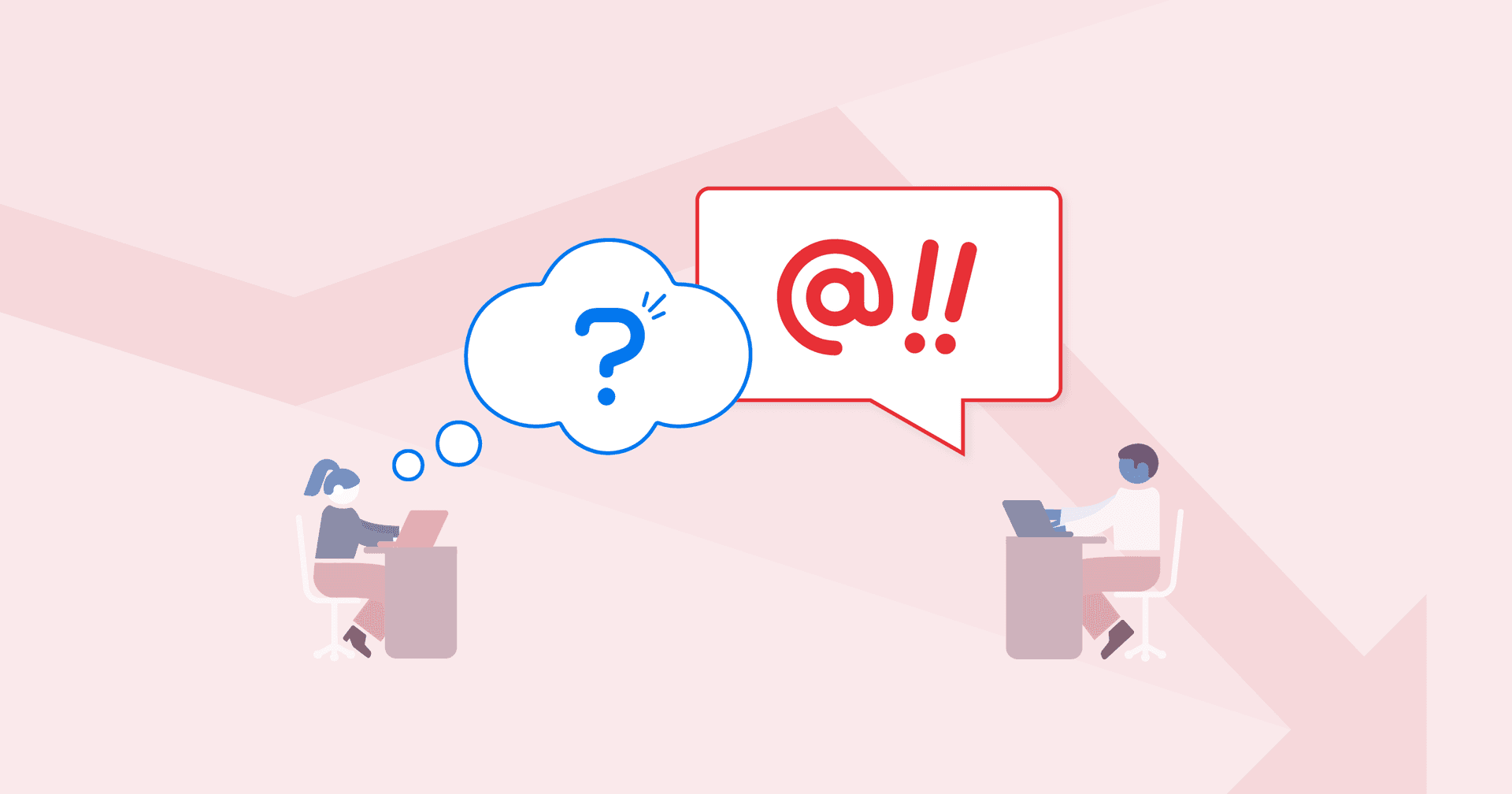Table of Contents
QUICK SUMMARY:
A client exit interview is a structured conversation a marketing agency conducts with a client who is ending their engagement. Its purpose is to gather feedback on the agency's performance, understand the reasons behind the client's departure, and identify areas for improvement. Learn how to conduct a customer exit interview, identify which survey questions to ask, and discover the top 5 exit interview mistakes to avoid.
“I love hearing negative feedback,” said no one ever.
Unless you enjoy awkward conversations with departing clients, chances are you’re not excited about booking a client exit interview.
While it can be difficult to approach a client who has canceled their contract, conducting exit interviews is a crucial step that shouldn’t be skipped.
If you approach these interviews with care, observation, and curiosity, you’ll be set up for success to get as much valuable information as possible. What you do with that information is up to you, but if you conduct the exit interview correctly you’ll have the opportunity to learn from your past experiences and use the constructive feedback to improve customer retention moving forward.
So don’t be afraid to schedule those uncomfortable conversations to make your agency better than ever.
In this article, we’ll look at:
How To Prepare for the Exit Interview
Whether your client left on positive or negative terms, you want to be as prepared as possible before conducting the client exit interview. For one, it ensures that the meeting stays professional and structured. And two, preparing a set of questions prior to the interview helps you get as much feedback and information as possible to take back and improve upon.
Follow these steps to ensure a smoother experience that mutually benefits both parties.
Step 1: Determine Who Will Conduct the Exit Interview
Firstly, you’ll need to identify the person on your team who will be conducting the exit interview.
Client exit interviews at a marketing agency are typically conducted by someone in a client-facing role, who has had a close relationship with the client throughout the duration of the partnership. This could be an Account Manager, Client Success Manager, or even a Director of Client Services.
Some agencies opt to have their CEO conduct them to learn about business direction, but as an agency grows, this becomes too time-consuming for a busy CEO.
The different approaches often depend on the internal structure of the marketing agency. For example, if you’re a boutique agency with a smaller team, management may have more bandwidth to participate.
Myself, the owner typically does exit interviews. We're a smaller team, and I’m the one who sells the service and then hands the project off to account and project management with somewhat frequent check-ins with me, and I'm in on a lot of update calls. For that reason, I feel it is important that I take extreme ownership over the things we may have failed at.
Josh Kimmes, CEO at Bear Noth Digital
Even if your management team is not as involved in the day-to-day operations, you may still feel like the right person to conduct these interviews.
I conduct the exit interviews. No one on our team can take in the clients’ feedback and respond more personally or with more responsibility than the founder.
Adam Palmer, President of Inertia Digital Marketing
Other agencies find it works best to get someone who wasn't directly involved with the client at all to help extract this customer insight.
We find it beneficial for peers (or a third party) to conduct client exit interviews. By reducing the bias and/or defensive reactions, we can gather a broader range of insights.
Vince Schwellenbach, CEO of Macbach Health Care Solutions
Your agency needs to determine who will be the best person appointed to this process and who will make your customers feel valued and heard. You always want to look for ways to enhance the customer experience, especially at this critical moment.
As VP of Operations, I now handle client exit interviews. I'm not involved in the day-to-day activities on most client campaigns, so clients may feel more comfortable sharing transparent feedback with some distance. I also recognize that there is more "weight" to my role, so clients feel valued in having their perspective solicited from a senior member of the team.
Amanda Stephens, VP of Operations at seoplus+
In some cases, particularly for high-value or complex client relationships, it may also be appropriate to have more than one person present during the exit interview, such as someone from the management team along with the account manager. This ensures that different perspectives are taken into account when interpreting the feedback and planning any necessary changes.
Last, but certainly not least, the person conducting the client exit interview must be able to do so without becoming defensive. But more on this later.
Step 2: Review the Client’s History With Your Agency
Familiarize yourself with the client’s campaign history. Even if you were actively involved with the client, it always helps to give yourself a bit of a refresher on the minute details.
By understanding their journey with your agency, you determine whether there were any missed opportunities, unresolved issues, or unmet expectations that could have been addressed earlier.
Before the call, I briefly review the client's project history, including key milestones, challenges faced, and the results achieved. This helps me tailor the conversation and ask specific questions relevant to their experience.
Oliver Moreno, CEO and Founder, Bright Click
Arming yourself with plenty of information before the interview certainly won’t hinder you. If anything, it helps you tailor the interview based on their specific circumstances and your genuine interest in their business. This may include speaking to different team members to get a better understanding of their relationship with your agency.
Speak with staff about the situation and get their feedback regarding why the client may be leaving, and look at the results we achieved for the client.
Dr. Richard Girling, CEO, Red Castle Services INC.
Step 3: Set the Tone
When preparing for a client exit interview, it's essential to set the right tone to encourage open and honest communication.
Begin by reminding yourself of the purpose of the interview: to gain feedback, learn from the client's experiences, and improve future client-agency relationships. Approach the interview with a positive and empathetic mindset, demonstrating a genuine willingness to listen and understand the client's perspective. This mindset helps to establish a respectful and productive atmosphere for the conversation.
After all, you want your clients to feel comfortable opening up to you. The goal is to gather as much useful information from this client as possible. Otherwise, there wouldn’t be much of a purpose in conducting a customer exit interview.
Step 4: Determine the Method: In-person, On the Phone, or Online
Next, your agency should consider the most appropriate method of communication for the client exit interview based on the client's preferences and logistical considerations.
In-person interviews offer the advantage of face-to-face interaction, allowing for non-verbal cues and building rapport. However, they may not always be possible due to distance or time constraints.
Phone interviews provide a personal touch that accommodates remote clients. Video calls are also convenient and efficient for both parties. If all else fails, consider a client exit survey instead of a client exit interview to gather some information on why the client is parting ways. Exit surveys can be conducted asynchronously, allowing clients to respond to a written form according to their own schedule.
Select the method that best suits the circumstances and ensures optimal engagement with the client.
A combination of several tactics may be required. For example, sending a survey to gather initial feedback and then scheduling a follow-up call to add a personal touch or to expand on their preliminary responses.
Step 5: Formulating the Right Questions
Crafting the right exit interview questions helps obtain meaningful feedback during client exit interviews.
Start with general inquiries about the client’s overall experience with your agency, followed by more specific questions about the reasons for their departure and any areas they believe could have been improved.
Ask about your agency's strengths and weaknesses from their perspective, and inquire if there were any unmet client expectations. Look for suggestions for enhancing services or addressing any specific issues encountered. The goal is to tailor the questions to the client's unique situation and be prepared to probe deeper when necessary.
Aim for a balance between open-ended and targeted questions to gather comprehensive and actionable feedback.
It's really about giving the client an outlet and opportunity to express themselves. You don't want the questions to be so tight as to get exactly what you need, but not give your client the chance to share what's on their mind. This is why our questions are mostly open-ended versus yes/no.
Amanda Stephens, VP of Operations at seoplus+
Sample Questions To Ask During a Client Exit Interview
What kind of effective exit interview questions should your marketing agency be asking? Make sure they cover these four key areas:
Satisfaction With the Service Provided
Feedback About the Team and Communication
Reasons for Leaving
Suggestions for Improvements
We'll always get to the why, but I think it's also important to know how quickly people are making these decisions; this should influence how often we are making meaningful, engaged outreach to our clients.
Adam Palmer, President of Inertia Digital Marketing
Here is a sample list of the most important questions to ask during a client exit interview, backed by real marketing agencies that we surveyed.
1. What worked well?
2. What didn't work?
3. On a scale of 1-10, would you recommend our agency to a friend, family or colleague?
4. How would you compare our marketing agency to past marketing agencies or contractors you’ve used before?
5. When did you make the decision to leave?
4. Why did you choose to work with our agency at the time of signing?
5. How effective was our communication with you?
6. Did you feel our services were worth the cost?
7. Did our agency provide you with good value for your investment?
8. How would you rate your interactions with our team? Were there any team members who stood out, either positively or negatively?
9. Are you leaving us for another agency or service provider? If yes, what factors influenced this decision?
10. Under different circumstances, would you consider re-engaging with our agency in the future? Would you recommend our services to others? If not, why?
Open-ended questions aim to reveal honest insights about the client's experience with the agency, leading to actionable feedback that can be used to improve future client relationships and service offerings.
Vince Schwellenbach, CEO of Macbach Healthcare Solutions
Client Exit Interview Template
To help you get started, we created a template for you to use during the client exit interview. Use this template to document all of the feedback you’re receiving.
Client Details (Name, Role, Company) | Date | |
|---|---|---|
Michael Scott, Regional Manager, Dunder Mifflin Paper Company | March 24, 2005 |
Phase | Questions |
|---|---|
Phase 1: Small Talk Break the ice with small talk to make the conversation feel more comfortable. | Thank you for taking the time to meet with us today. Before we dive into the conversation, we don’t mind any critical feedback. So don’t worry about hurting our feelings. We want to have an open conversation about how you started working with our agency with X,Y,Z services, what problems you faced with those services, and then why you eventually canceled. |
Phase 2: Evaluation These questions are meant to determine your clients’ expectations when hiring your agency. | Q) What prompted you to initially seek out our marketing agency? Did you evaluate other marketing agencies? Q) What were your business goals at the time? What were you hoping to accomplish with our services? Q) When was the first circumstance where you thought our agency wasn’t the right fit for your goals? |
Phase 3: The Relationship These questions help your agency better understand if there were issues in your client management process or the agency’s offering. Was it your pricing? Was it the type of services you offer? The communication? | Q) How effective was our communication with you? Frequency? What could we have done better or differently? Q) Did you feel our services were worth the cost? |
Phase 4: The Replacement These questions help your agency better understand the client seeking out other options. Are they moving to an in-house team, or another agency? What is that new agency promising to provide that yours didn’t? | Q) Are you moving to another agency or service provider? Q) If yes, what factors influenced this decision? |
Phase 5: Closing Remarks These should be treated as ‘nice-to-have’ answers to help you understand where your agency stands in the mind of your leaving client. It always helps to end things on a positive note, if possible. | Q) What was the biggest benefit of the services we provided for you? Q) Under different circumstances, would you consider re-engaging with our agency in the future? Q) Would you recommend our services to others? If not, why? Thank you for taking the time to provide this valuable feedback. I’m looking forward to sharing your answers with the rest of the team. |
5 Mistakes To Avoid During Client Exit Interviews
The final conversation you have with your client is so important because it leaves a lasting impression of your agency in the client’s mind.
Here are some common mistakes to avoid to ensure both parties remain calm, cool, and collected throughout the entire process.
1. Trying To Win Them Back
Approaching the customer exit interview with a desperate or overly persuasive mindset does not work to anyone’s advantage.
Avoid pressuring the client to reconsider their decision. Instead, the purpose of the interview is to genuinely understand their reasons for leaving, so that you improve customer success in the future. You don’t want to risk damaging your professional relationship and any possible future opportunities for collaboration.
An exit interview is not your time to shine or make a last-ditch effort to lure back a client. They've left for a reason—make sure you understand that reason to prevent more from leaking out the same way later. The truth is, you've done some things to be in this position. Learn from them.
Vince Schwellenbach, CEO of Macbach Healthcare Solutions
2. Not Actively Listening
If you want to receive quality feedback from your clients, you need to reciprocate that in your demeanor. Not paying attention, interrupting, or showing a lack of interest are all behaviors you want to avoid. Don’t engage in multitasking or other distractions during the interview. Your emails and phone notifications can wait.
Give departing clients your full and undivided attention. Repeat back your understanding of what they’ve communicated so that they feel heard, and ask relevant follow-up questions to deepen your comprehension of their experience.
Just listen. I don't view this as a time to turn the conversation around. That was yesterday.
Adam Palmer, President of Inertia Digital Marketing
3. Making It About Your Agency
It can be tempting to try and change your client’s perception of your agency and only focus on all the good that you accomplished for them. However, this will only come across as promotional, making a client feel like they’re the problem. You want to avoid deflecting negative feedback and take ownership of any shortcomings.
The focus of the interview is your departing client. Regardless of whether or not you agree with their feedback, this is your time to listen to them and hear what they have to say about their experience with your agency.
Don't make it about you. While the feedback you hear will help you grow and better service other clients down the road, this doesn't matter to the person leaving you. Make it about them: validate their experience, value their perspective, and value them sharing their time & energy with you.
Amanda Stephens, VP of Operations at SEO Plus+
4. Becoming Defensive
It’s always a challenge not to take criticism personally. But, reacting emotionally or defensively only hinders the open and honest communication that you’re striving for.
Justifying or rationalizing your agency’s actions will only lead to an unproductive interview that will come across as dismissing the client’s concerns. The goal is to maintain a professional, constructive conversation. To do that, you’ll need to remain open to understanding the client’s perspective and to welcome the criticism they’re likely to provide in the interview.
Check your ego at the (virtual) door. An exit interview is for learning and taking in feedback. If you're defending yourself and your guardrails are up, your insights aren't going to be as valuable.
Josh Kimmes, CEO at Bear Noth Digital
5. Avoiding Them Altogether
If your agency hasn’t implemented a client exit interview strategy, you’re missing out on valuable feedback for areas of improvement that will help your business excel.
Assuming the reasons for your client leaving without asking for clarification could lead to misinterpretation, sending you down the wrong rabbit hole and impeding your agency’s growth.
Most agencies are very busy, so it can be easy to say, 'we are too busy to do exit interviews.' But the fact is that exit interviews are one of the best possible uses of your time. It's a time when clients have nothing to lose, so they can be 100% honest with you. The feedback they provide is like gold—allowing you to tailor your services to what your clients really want and need.
Dr. Richard Girling, CEO of Red Castle Services INC.
The Takeaway
Client exit interviews are a vital step your agency should be taking toward continuous improvement. After all, who doesn’t want to increase their customer lifetime value and build stronger, longer-lasting client relationships?
Remember to approach the interview with empathy and use the feedback gathered to make targeted improvements. Done right, effective exit interviews can take the client departure process from awkward to awesome, enhancing client loyalty, improving customer success, and strengthening your agency's reputation.
We didn't solicit feedback for a long time. Mostly because we were scared to hear it. Partly because we assumed we knew the issues, or we felt the client had already communicated their reasons. Now that we've ripped the band-aid off, the only bad feedback is no feedback! Everything else can help us grow and improve.
Amanda Stephens, VP of Operations, Seoplus+
Like this article? Monitor your campaigns, collaborate with your team, and provide seamless client communication with AgencyAnalytics.

Scale your marketing agency by monitoring all of your growth KPIs in a single marketing dashboard. Get started with your free 14-day trial today.

Written by
Richelle Peace is a writer with a degree in Journalism who focuses on web content, blog posts, and social media. She enjoys learning about different topics and sharing that knowledge with others. When she isn’t writing, Richelle spends time teaching yoga, where she combines mindfulness, movement, and her passion for wellness.
Read more posts by Richelle PeaceSee how 7,000+ marketing agencies help clients win
Free 14-day trial. No credit card required.






